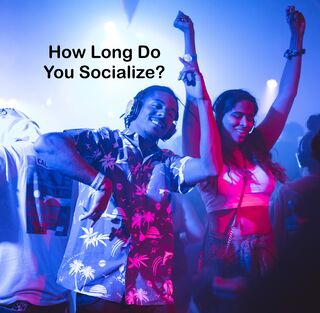
A new paper quantifies patterns of socializing throughout the day.
Source: Photo by Martin Lopez from Pexels
You wake up in the morning. You have a short conversation with your partner about walking the dogs and feeding the kids. During the morning, you do some focused work, not talking much at all. Then you break for lunch, sitting with a friend and talking about your family and weekend plans. You go back to work in the afternoon, but you’re distracted and you take a few breaks. In the evening, you come home and spend time with your kids and partner, talking and listening for a while. How should psychologists measure your social life?
It is still rare in psychology to even try to measure people’s daily lives outside of the lab. Most studies of social processes would ask people to fill out a survey about how much they interact with people, or maybe ask people to come into the lab to have a conversation with a friend or stranger. But the Electronically Activated Recorder (EAR) device, which has been developed by Matthias Mehl and his collaborators over the past couple of decades, allows some insight into our social lives “in the wild.” I wrote last week about how it gives us new insight into the ways personality manifests itself in daily life. For example, people who say they’re more extraverted tend to talk more.
You can measure social lives by seeing how often, on average, a person is talking throughout the day. That approach has been used to good effect in many research projects, including one showing that the most time a person spends talking to others, the more satisfied with their life that person reports being.
But from my description of a “day in the life” of an individual above, you can see that something is missing. Socializing isn’t a random process, where at any moment you might or might not be talking to someone. It involves patterns over time. Some conversations are short, others are long; sometimes long conversations occur frequently in a day, other times they might just occur once. In a new paper I wrote with professors Dave Sbarra and Matthias Mehl, I try to come up with a way of measuring this patterning in our social lives.
Drawing on my training in dynamic systems, I applied a fancy stats procedure to data measuring people’s social lives on the weekend. Participants in this study wore the EAR device while they went through their daily lives, and it made regular recordings. Trained coders then went through all these recordings to note if the participant was speaking. My analysis applied a technique called Recurrent Quantification Analysis (RQA) to these sequences of speech and non-speech, pulling out a set of measures related to how long people’s typical conversations were.

The statistical approach I used captures patterns in a sequence of measures of socializing.
Source: Image by A. Danvers
For me, just trying to figure out a way to represent patterns of people’s social lives in numbers was an interesting challenge. But my colleagues and I also wanted to show that this should matter to psychologists with broader interests. To do that, I created some machine learning models to show how well patterns of socializing could predict personality.
Our results showed that taking into account patterns of social behavior improved prediction for extraversion, conscientiousness, neuroticism, and openness—but not for agreeableness. Another way of putting it is that by going beyond just measuring how often someone talks, and adding information about what their pattern of conversations was like during the day, we can get more insight into their personality.
Not surprisingly, extraverts don’t just spend more time talking—they also spend more time in extended conversations, and the conversations they end up in wind up lasting longer. Also interesting, conscientious people tended to have conversation lengths that varied more. This might be due to a desire to cut short conversations that stretch on too long if they’re impeding productivity.
The strongest effect we found, though, was related to neuroticism. People whose personality tests rate them as more neurotic tend to spend less time in extended conversations, tend to have their longest conversations of the day be relatively short, and tend to have the conversations they do start get wrapped up more quickly. What’s important to me about this analysis is that traditional approaches found no significant relationship between how much someone talks overall and neuroticism. So if you didn’t think about patterns of socializing over the course of the day, you’d completely miss this relationship—and it’s a large effect by the standards of personality research.

Neurotic people tend to have shorter conversations.
Source: Photo by cottonbro from Pexels
Why do neurotic people have shorter conversations? Our research team thinks there are two probable explanations. First, it could be that neurotic people experience more anxiety in social situations, leading them to cut off conversations early. Second, it could be that neurotic people’s tendency to experience more negative emotions makes them more of a downer to talk to, and so other people tend to cut conversations short. Or it could be something else!
This project was descriptive, meaning it was meant to lay out what was going on, as opposed to test a specific prediction or theory. But it’s my hope that these measures will start providing more insights into patterns of socializing that will eventually lead to specific theories and predictions. In the meantime, consider whether the neurotic people in your life might want you to stick out conversations a little longer—or end them earlier!
"social" - Google News
August 08, 2020 at 07:23AM
https://ift.tt/3fEF3FI
How Is Personality Related to Your Social Patterns? - Psychology Today
"social" - Google News
https://ift.tt/38fmaXp
https://ift.tt/2WhuDnP
Bagikan Berita Ini














0 Response to "How Is Personality Related to Your Social Patterns? - Psychology Today"
Post a Comment